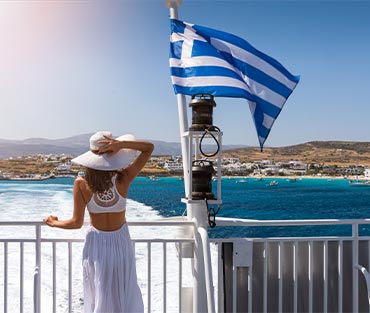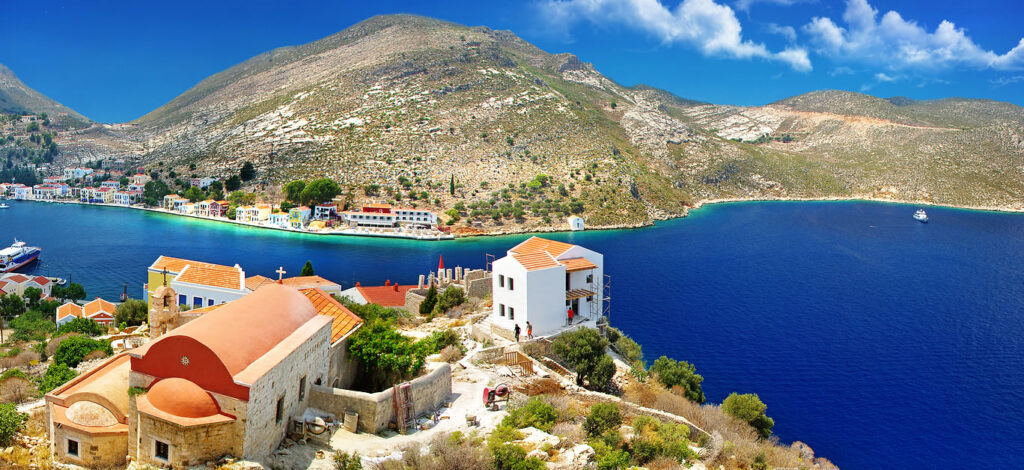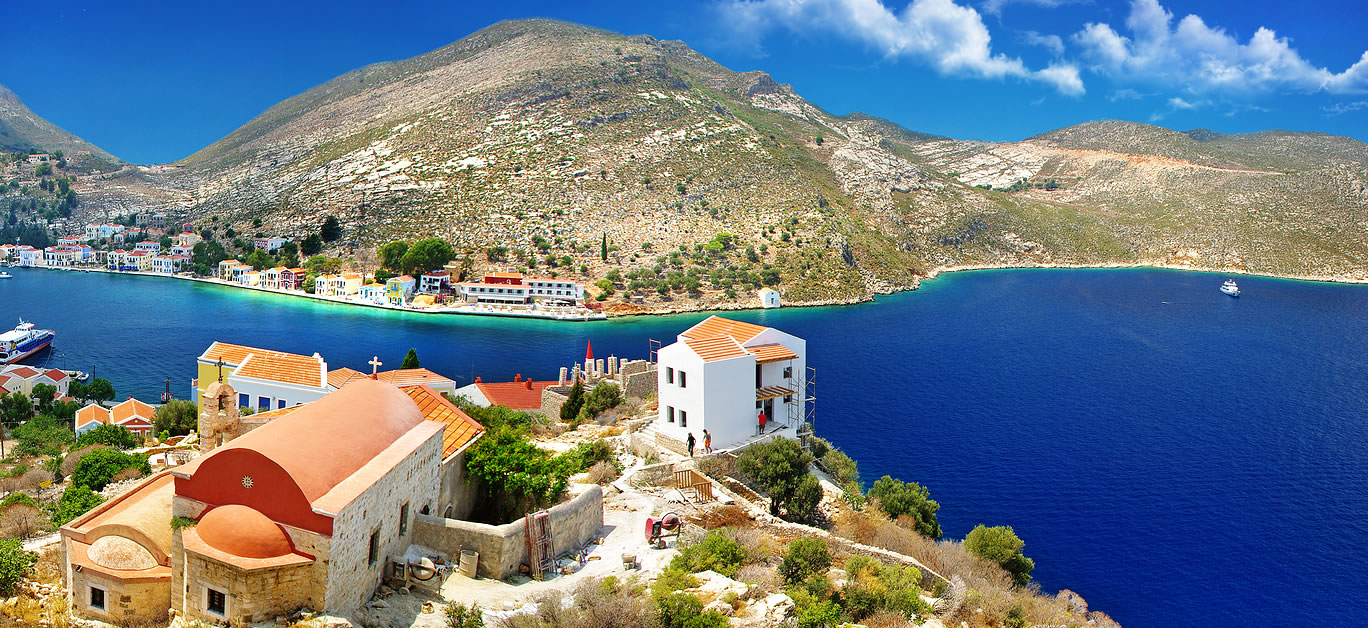Are you dreaming of crystal-clear turquoise waters, breathtaking sunsets, and ancient ruins? Look no further than Greece, a country known for its picturesque landscapes and rich history. This beginner’s guide will take you on a journey through the Greek islands, providing tips and insights on how to navigate this island-hopping paradise. From the world-famous Santorini to the hidden gems of Crete, get ready to embark on an adventure of a lifetime. So grab your sunscreen, pack your bags, and let’s explore the enchanting Greek islands together.

Choosing Which Islands to Visit
Consider Your Interests and Preferences
When planning your trip to the Greek islands, it’s important to first consider your interests and preferences. Each island has its own unique charm and attractions, so think about what you enjoy most in a vacation. Are you a beach lover, a history enthusiast, or someone who loves to explore nature? This will help you narrow down the islands that align with your interests and ensure you have a memorable experience.
Research the Different Islands
Once you have an idea of what you’re looking for in an island destination, it’s time to do some research. Greece is home to over 6,000 islands, each with its own character and charm. Look into the different islands in the Cyclades, Dodecanese, Ionian Islands, Saronic Islands, Sporades, and Crete. Read up on their attractions, landscapes, and activities to get a better understanding of what each island has to offer. This will help you make an informed decision and create an itinerary that suits your preferences.
Take into Account Accessibility and Transportation Options
When choosing which islands to visit, it’s important to take into account their accessibility and transportation options. Some islands are easily reached by ferry or domestic flights, while others may have limited transport connections. Consider whether you prefer a more seamless travel experience or if you’re open to taking less conventional modes of transportation. Keep in mind that frequent transfers can be time-consuming, so strike a balance between convenience and exploring off-the-beaten-path destinations.
Planning Your Trip
Decide on the Duration of Your Trip
The duration of your trip will play a crucial role in determining how many islands you can visit and how much time you can spend on each. Greek islands are known for their laid-back atmosphere and captivating beauty, so don’t rush your experience. Depending on your schedule, consider dedicating at least 3-4 days to each island to fully immerse yourself in its sights and culture. If you have limited time, focus on exploring fewer islands rather than trying to see them all in a short period.
Finalize Your Itinerary
Once you’ve chosen the islands you want to visit and decided on the duration of your trip, it’s time to finalize your itinerary. Consider the logistics of traveling between islands and plan your route accordingly. Take into account ferry schedules, flight availability, and the time it takes to travel between islands. Try to group islands that are in close proximity to minimize travel time. Be mindful of distances and plan your itinerary in a way that allows you to make the most of your time exploring each island.
Book Accommodations and Transportation in Advance
To ensure a smooth island hopping experience, it’s advisable to book your accommodations and transportation in advance. Popular islands can get crowded during peak travel seasons, so securing your accommodations early will help avoid any last-minute availability issues. Similarly, booking your ferry tickets or domestic flights in advance will give you peace of mind and allow for better planning. Keep in mind that some islands have limited accommodation options, especially smaller or more remote ones, so it’s best to book early.
Understanding Greek Island Groups
Cyclades
The Cyclades, located in the Aegean Sea, are the most famous and popular island group in Greece. This group includes iconic islands such as Santorini, Mykonos, and Naxos, known for their breathtaking landscapes, picturesque villages, and vibrant nightlife. Each island in the Cyclades has a unique atmosphere and charm, attracting different types of travelers. Whether you’re looking to party the night away, immerse yourself in ancient history, or simply relax on stunning beaches, the Cyclades offer something for everyone.
Dodecanese
Situated in the southeastern part of the Aegean Sea, the Dodecanese islands are known for their rich history and medieval architecture. Rhodes, the largest island in the group, boasts a well-preserved medieval town and ancient ruins. Other notable Dodecanese islands include Kos, Patmos, and Symi, each offering its own distinct charm. Explore ancient castles, visit medieval towns, and soak in the sun by turquoise waters while experiencing the unique cultural fusion that characterizes the Dodecanese islands.
Ionian Islands
The Ionian Islands, located on the western side of Greece, are known for their lush green landscapes, crystal-clear waters, and charming Venetian architecture. Corfu, the most popular island in the group, combines stunning natural beauty with a rich cultural heritage. Zakynthos, Kefalonia, and Lefkada are other popular destinations in the Ionian Islands, offering magnificent beaches, dramatic cliffs, and traditional villages. If you’re seeking a more relaxed and nature-oriented island hopping experience, the Ionian Islands are not to be missed.
Saronic Islands
Located just off the coast of Athens, the Saronic Islands offer a convenient escape from the bustling capital. Aegina, Poros, Hydra, and Spetses are the main islands in this group, each with its own unique character. Hydra, known for its car-free town and charming harbor, is a favorite among artists and bohemian travelers. Aegina, on the other hand, boasts historical sites and pistachio orchards. The Saronic Islands are easily accessible from Athens, making them a popular choice for a day trip or a short getaway.
Sporades
Nestled in the northwest Aegean Sea, the Sporades islands are known for their natural beauty and tranquil surroundings. Skiathos, Skopelos, and Alonissos are the main islands in this group, offering lush vegetation, turquoise waters, and secluded beaches. The Sporades are ideal for nature lovers, with opportunities for hiking, boat tours, and wildlife-spotting. If you’re looking to escape the crowds and immerse yourself in the unspoiled beauty of the Greek islands, the Sporades should be at the top of your list.
Crete
Crete, the largest and most diverse Greek island, deserves a category of its own. With its rich history, stunning landscapes, and vibrant culture, Crete offers endless opportunities for exploration. Visit the Palace of Knossos to immerse yourself in ancient Minoan civilization, hike through the Samaria Gorge for breathtaking views, and stroll around the charming old town of Chania. Crete is also home to beautiful beaches and traditional villages, allowing you to experience the best of both worlds. Plan to dedicate a significant amount of time to explore this captivating island.
Getting to the Greek Islands
By Air
Flying is the fastest and most convenient way to reach the Greek islands, especially if you’re short on time. Greece has several international airports, with major hubs in Athens, Thessaloniki, and Heraklion in Crete. From these airports, you can take domestic flights to the islands. Popular island destinations like Santorini, Mykonos, and Rhodes have their own airports and are well-connected to the mainland. Be sure to check flight schedules and book in advance, especially during peak travel seasons, to secure the best deals.
By Ferry
Ferry travel is a quintessential part of the Greek island hopping experience. Greece has an extensive ferry network, connecting the mainland with the islands and facilitating island-to-island travel. Ferry routes vary in duration, with some trips taking a few hours and others overnight. The choice between fast ferries and conventional ferries depends on your preferences and budget. Fast ferries are quicker but tend to be more expensive, while conventional ferries provide a more relaxed and affordable option. Check ferry schedules, book your tickets in advance, and arrive at the ports early to secure a good seat.

Getting Around the Greek Islands
Ferry Network
Once you’ve arrived on your first island, the ferry network becomes your lifeline for exploring the other islands. The Greek ferry system is reliable and efficient, making it easy to island hop at your own pace. Most islands have well-connected ferry ports, with frequent departures to neighboring islands. Plan your itinerary to make the most of the ferry schedules and be sure to check the duration of the ferry rides. Some routes may be shorter, while others may involve longer travel times. Enjoy the scenic views, embrace the leisurely pace of ferry travel, and get ready for the exciting adventures awaiting you on each island.
Domestic Flights
If you’re looking to cover more ground or visit islands that are farther apart, domestic flights are a convenient option. Greece has several regional airports on popular islands, allowing for quick and hassle-free travel. Domestic flights are particularly useful when visiting islands in different island groups, such as combining the Cyclades with the Ionian Islands. It’s best to book your flights in advance to secure affordable fares and to ensure availability, especially during peak travel periods. Keep in mind that baggage restrictions may apply, so check with the airline before packing.
Public Transportation on the Islands
Once you’ve reached an island, you’ll have various options for getting around and exploring the local attractions. Most Greek islands have reliable public transportation systems, such as buses or local taxis, that connect the main towns and villages. Buses are a cost-effective option and are usually well-coordinated with ferry arrivals and departures. Local taxis can be more convenient, especially if you’re traveling in a group or carrying heavy luggage. However, in peak tourist seasons, be prepared for long lines and limited availability. Research the public transportation options available on each island to make the most of your time and budget.
Renting a Car or Scooter
For more freedom and flexibility in exploring the islands, consider renting a car or scooter. Renting a car allows you to venture off the beaten path, discover hidden gems, and make spontaneous stops along the way. Keep in mind that some islands, particularly smaller ones, may have limited road infrastructure, so plan accordingly. Scooters are a popular choice for island exploration, especially in places like Mykonos and Santorini, where narrow streets and heavy traffic can make driving a car challenging. Before renting, ensure you have the required driver’s license and familiarize yourself with local driving regulations.
Exploring the Islands
Must-Visit Islands
While every Greek island has its own allure, certain islands are considered must-visits for their iconic attractions and natural beauty. Santorini, with its stunning sunsets and unique volcanic landscapes, is a top choice for honeymooners and couples. Mykonos, known for its vibrant nightlife and cosmopolitan atmosphere, attracts partygoers and luxury-seeking travelers. Crete, with its diverse landscapes and rich history, offers something for everyone. Don’t forget to include islands like Naxos, Rhodes, Corfu, and Zakynthos in your itinerary, as they are equally captivating and offer a diverse range of experiences.
Popular Beaches and Activities
Greek islands are renowned for their pristine beaches and azure waters, offering endless opportunities for relaxation and water activities. Myrtos Beach in Kefalonia, Navagio Beach in Zakynthos, and Elafonisi Beach in Crete are just a few examples of the stunning beaches awaiting you. Explore hidden coves, take leisurely swims in crystal-clear waters, or simply unwind under the Mediterranean sun. If you’re a water sports enthusiast, most islands offer activities such as snorkeling, scuba diving, and jet skiing. Embark on boat tours to explore sea caves, visit remote beaches, and snorkel in vibrant underwater landscapes.
Local Cuisine and Dining Experiences
A trip to the Greek islands wouldn’t be complete without indulging in the local cuisine. Greek food is known for its fresh ingredients, rich flavors, and healthy Mediterranean diet. Enjoy traditional dishes like moussaka, souvlaki, and fresh seafood delicacies. Look out for local tavernas and family-run restaurants, as they often offer the most authentic dining experiences. Sit back, relax, and enjoy a meze-style meal, where a variety of small plates are served, allowing you to savor a variety of flavors. Don’t forget to sample local wines, especially those produced in Santorini and Crete.
Cultural Sites and Landmarks
Greek islands are teeming with rich history and cultural heritage, offering a wealth of archaeological sites and landmarks to explore. Visit the ancient ruins of Akrotiri in Santorini, the Palace of the Grand Master in Rhodes, or the Venetian Fortress in Corfu. Explore Delos, a UNESCO World Heritage Site, to immerse yourself in ancient Greek mythology. Don’t miss the monasteries of Meteora, perched on towering rock formations. Each island has its own unique historical sites and landmarks, so be sure to delve into the fascinating history and mythology of the Greek islands.

Packing Essentials
Clothing and Footwear
When packing for your island hopping adventure, it’s important to pack appropriate clothing and footwear. Opt for lightweight, breathable fabrics to combat the Mediterranean heat. Pack a mix of casual and dressier clothes, as some islands have vibrant nightlife scenes. Comfortable walking shoes are essential for exploring ancient ruins and hilly landscapes, while sandals or flip-flops are perfect for beach days. Remember to bring a light jacket or shawl, as evenings can sometimes get chilly, especially during spring and autumn.
Beach Gear and Swimwear
Since the Greek islands are known for their stunning beaches, be sure to pack all the necessary beach gear and swimwear. Don’t forget sunscreen, sunglasses, and a wide-brimmed hat to protect yourself from the strong Mediterranean sun. Bring a beach towel or mat, beach bag, and a good book to enjoy the laid-back beach vibes. Snorkeling gear can also come in handy if you plan on exploring underwater ecosystems. Most importantly, pack a positive mindset and a spirit of adventure to fully enjoy the beach hopping experience.
Sun Protection
Sun protection is crucial when spending time under the Mediterranean sun. Pack a high SPF sunscreen and don’t forget to reapply regularly, especially after swimming. Aloe vera gel or after-sun lotion can soothe sunburns and keep your skin hydrated. It’s also important to wear a hat, sunglasses, and lightweight clothing that covers your shoulders and legs to protect against sunburn and overheating. Take care of your skin and stay hydrated throughout your island hopping journey.
Travel Documents and Money
Before embarking on your Greek island adventure, ensure you have all the necessary travel documents. Carry a valid passport with at least six months of validity remaining. Check if you need a visa to enter Greece, as this may vary depending on your nationality. Keep photocopies of important documents, such as your passport and travel itinerary, and store them separately from the originals. It’s also advisable to inform your credit card company of your travel plans, as using cards is the most convenient method of payment on the islands. Carry some cash for smaller establishments that may not accept cards.
Navigating the Greek Island Culture
Learning Basic Greek Phrases
While many Greeks in popular tourist areas speak English, learning some basic Greek phrases can go a long way in connecting with the locals and immersing yourself in the Greek island culture. Simple greetings like “Kalimera” (Good morning), “Efharisto” (Thank you), and “Parakalo” (Please) can make a positive impression. Embrace the opportunity to learn more about the local language and culture, and don’t be afraid to engage in conversations with the friendly islanders.
Understanding Local Customs and Etiquette
Greek island culture is steeped in traditions and customs that may differ from what you’re used to. It’s important to be aware of and respect local customs and etiquette. Greeks are known for their warm hospitality, so be sure to reciprocate their kindness and generosity. In restaurants, it is customary to wait for the bill to be brought to you, rather than asking for it. When visiting churches or monasteries, dress modestly and observe any rules or restrictions. Remember to remove your shoes when entering someone’s home and always ask before taking photographs of people.

Dealing with Island Hopping Challenges
Rescheduling and Delays
Island hopping in Greece may sometimes come with unexpected challenges, such as rescheduling and delays. Weather conditions, mechanical issues, or changes in ferry schedules can disrupt your travel plans. It’s important to remain flexible and be prepared for last-minute changes. Keep an eye on weather forecasts, especially if you’re planning to visit during the off-season when conditions can be more unpredictable. Allow for some buffer time between ferry transfers to account for any unexpected delays. Embrace the slower pace of island life and make the most of any unexpected detours by exploring nearby attractions or enjoying a leisurely meal at a local taverna.
Weather Conditions
Weather conditions can significantly impact your island hopping experience, especially if you’re visiting during the peak summer months. While Greece generally enjoys a Mediterranean climate with long, hot summers, occasional strong winds (known as “meltemi”) can affect ferry schedules. Be prepared for sudden changes in weather and adjust your plans accordingly. Don’t let a rainy day dampen your spirits; use it as an opportunity to explore museums, discover local cuisine, or simply relax and recharge. Pack a light rain jacket or umbrella and be prepared for various weather conditions during your island hopping adventure.
Dealing with Crowds
Greek islands are popular tourist destinations, and during peak travel seasons, they can get crowded, especially on the more popular islands. Be prepared for larger crowds, longer queues, and limited availability in restaurants and accommodations. To avoid the largest crowds, consider visiting during the shoulder seasons (spring and autumn), when the weather is still pleasant, and tourist numbers are lower. Additionally, exploring lesser-known islands can provide a more peaceful and authentic island experience. Embrace the crowds as part of the vibrant Greek island atmosphere and be patient as you navigate through popular attractions and cultural sites.
Tips for a Smooth Island Hopping Experience
Travel Light
One of the most valuable tips for a smooth island hopping experience is to travel light. Packing light will make it easier to move between islands and navigate through ferry terminals. Opt for a versatile wardrobe that can be mixed and matched, minimizing the number of clothing items you need to bring. Consider doing laundry during longer stays to reduce the number of outfits you need to pack. Remember that most islands have supermarkets and shops where you can purchase toiletries and other essentials, so there’s no need to overpack.
Be Flexible with Your Itinerary
While it’s important to plan your island hopping itinerary in advance, it’s equally important to remain flexible and open to changes. Unexpected discoveries, recommendations from fellow travelers, and local events can alter your plans, so leave room for spontaneity. Embrace the Greek concept of “filoxenia” (hospitality) and trust that the locals will guide you to hidden gems and local experiences. Be willing to modify your itinerary to accommodate last-minute changes or unexpected opportunities that may arise during your island hopping adventure.
Be Respectful of the Environment and Local Communities
As you explore the beautiful Greek islands, it’s important to prioritize sustainability and respect for the environment and local communities. Dispose of waste responsibly, recycle when possible, and avoid single-use plastics. Many islands have initiatives to protect their fragile ecosystems, so be mindful of any guidelines or restrictions in place. Respect local customs and traditions, and be considerate of the local way of life. Engaging with the community in a respectful and sustainable manner will not only enhance your island hopping experience but also contribute to the preservation of these beautiful destinations for future generations.
In conclusion, island hopping in Greece is a remarkable adventure that allows you to discover the diverse beauty and rich culture of the Greek islands. By considering your interests and preferences, researching different islands, and taking accessibility and transportation options into account, you can create a personalized itinerary that suits your travel style. Whether you choose to explore the vibrant nightlife of Mykonos, immerse yourself in ancient history in Crete, or simply relax on secluded beaches in the Ionian Islands, each island offers an unforgettable experience. With careful planning, packing essentials, and a willingness to embrace the Greek island culture, your island hopping journey is sure to be a memorable one. So, pack your bags, set sail, and get ready for a sun-soaked adventure in the mesmerizing Greek islands.

